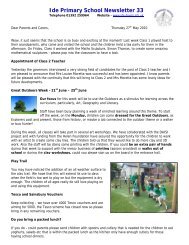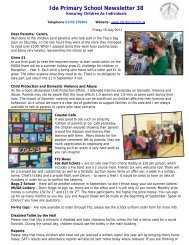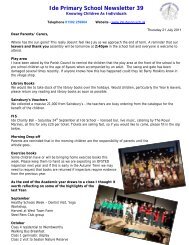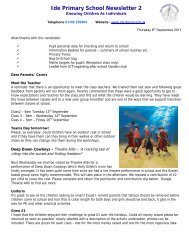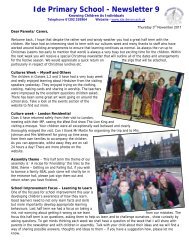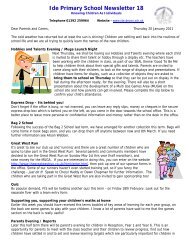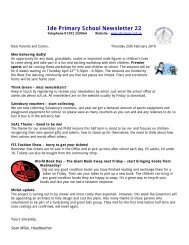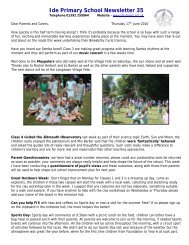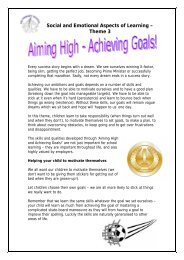Mission Statement - Ide Primary School
Mission Statement - Ide Primary School
Mission Statement - Ide Primary School
You also want an ePaper? Increase the reach of your titles
YUMPU automatically turns print PDFs into web optimized ePapers that Google loves.
WELCOME!<br />
We hope you find this prospectus interesting and informative. If it does not answer<br />
all your questions, or even if it has, please do come and see us, as you are always<br />
welcome at <strong>Ide</strong> <strong>Primary</strong> <strong>School</strong>.<br />
<strong>Ide</strong> <strong>Primary</strong> <strong>School</strong><br />
High Street<br />
<strong>Ide</strong><br />
Exeter<br />
EX2 9RN<br />
Telephone/Fax: 01392 259964<br />
Email: admin@ide.devon.sch.uk<br />
Website: www.ideschool.org.uk
<strong>Mission</strong> <strong>Statement</strong><br />
To provide a safe, happy, challenging and stimulating environment, where children<br />
can grow personally, socially and academically. We offer an innovative curriculum<br />
underpinned by dedicated and imaginative teaching that develops a sense of purpose<br />
and curiosity in learning that will be life long.<br />
Aims<br />
We aim to provide a rich and varied curriculum, inspired by stimulating teaching<br />
and rooted in first-hand experiences.<br />
We aim to be a good role model to children and set a positive example through<br />
our interactions and the way we conduct ourselves daily.<br />
We aim to encourage partnership within and across the community so that staff,<br />
pupils, parents and citizens of <strong>Ide</strong> access an inclusive approach to learning.<br />
We aim to promote a healthy lifestyle, enabling children to be well rounded<br />
members of the community.<br />
We aim to provide high quality pastoral care that is built on valuing and respecting<br />
individuals with their own unique social and emotional needs.<br />
We aim to embrace new technologies and use them to enhance children’s learning<br />
and prepare them for life long learning.<br />
2
Welcome!<br />
A very warm welcome to <strong>Ide</strong> <strong>Primary</strong> <strong>School</strong>. This may be your first contact<br />
with us and we would like to emphasise at the outset that at <strong>Ide</strong> we believe<br />
that all children are important. We are concerned with the intellectual,<br />
spiritual, moral and physical well-being of all the children in our care. This is a<br />
happy school, where we work hard to<br />
ensure that children and their families are<br />
made to feel part of the school community<br />
from the very start.<br />
Why <strong>Ide</strong>?<br />
Parents often choose <strong>Ide</strong> <strong>Primary</strong> <strong>School</strong><br />
because of its size, distinctive approach to<br />
the curriculum and the value that it places<br />
on knowing children as individuals. Parents<br />
often select <strong>Ide</strong> because they wish to work<br />
in strong partnership with the school for the<br />
best of their children.<br />
Despite only admitting 15 children per year<br />
group the dedicated and committed<br />
teaching team are able to offer a curriculum<br />
and range of opportunities and experiences<br />
envied by many larger schools.<br />
Our mission statement is clear and sets out our main aims based around<br />
developing the whole child so that they can be well rounded adults and take a<br />
constructive place in society. We hope that children’s time with us will be full<br />
of happy memories and that in later life they will look back on their days at <strong>Ide</strong><br />
as being amongst their happiest.<br />
<strong>Ide</strong> is a popular and often over-subscribed primary school. Many children<br />
travel from outside the village area. The school admits just 15 children into<br />
each year group, organised into four classes. Class sizes range from between<br />
15 – 32. We have 6 teachers, including the headteacher and 8 teaching<br />
assistants<br />
3
STARTING SCHOOL – Section 1<br />
Whether your child joins us in the Reception class or at any other time during<br />
their school career, they can be assured of a warm welcome. Our experienced<br />
Reception teachers have a carefully constructed programme to aid transition.<br />
Many children joining the Reception class will already be familiar with school<br />
life and routines through close contact with the on-site pre-school – <strong>Ide</strong><br />
Childcare Trust. However a number of other children join us having attended<br />
other pre-school providers and the school arranges a series of open sessions as<br />
well as home visits for all children.<br />
ADMISSIONS<br />
All applications for a place at <strong>Ide</strong> should be made to the Local Authority (LA)<br />
which operates a timetabled co-ordinated admissions procedure for all <strong>Primary</strong><br />
<strong>School</strong>s in line with the government legislation. The LA will manage the<br />
process on behalf of the school according to the scheme published each year.<br />
The Governing Body, as the admission authority, will allocate the available<br />
places in line with this policy.<br />
www.devon.gov.uk/admissionsonline<br />
ADMISSIONS CRITERIA<br />
The criteria for admissions are as follows:<br />
1. Children in care for whom this is the nearest suitable school.<br />
2. Children living in the school’s designated area with a sibling who will be<br />
attending the school at the time of admission.<br />
3. Children living in the school’s designated area.<br />
4
4. Children living outside the school’s designated area, but with a sibling<br />
who will be attending the school at the time of admission.<br />
5. Children living outside the school’s designated area.<br />
SINGLE POINT OF ENTRY<br />
From September 2011 there will only be one point of entry for all children<br />
starting in the Reception Class which will September. There is also one<br />
induction point for children which will commence in the September also. We<br />
recognise that some parents of younger pupils may prefer a slightly more<br />
staggered start. Therefore for pupils born between March 1 st and 31 st August,<br />
there is the opportunity for them to start part time, by arrangement with the<br />
school. These children are offered the opportunity to attend mornings only<br />
until 12:15pm and increasing then to the end of the lunch period. All pupils are<br />
expected to attend full time by the October half term.<br />
NEW PARENT’S BREAKFAST<br />
In June, before your child starts school, all parents are invited to a coffee and<br />
croissant meeting during which you will meet with teachers, headteacher and<br />
the office manager to learn a little more about school life and routines.<br />
Informal visits before then are welcomed.<br />
HOME VISITS<br />
During the term before your<br />
child is due to start school, a<br />
teacher will come to see you<br />
and your child at home. We<br />
very much enjoy home visits,<br />
as they allow us to meet the<br />
children in their own<br />
environment and we find that<br />
parents and children also<br />
appreciate them.<br />
TASTER SESSIONS<br />
Children are also invited to<br />
attend three half day taster<br />
sessions in July, either in the<br />
5
morning or afternoon, to help them get used to some of the routines of school.<br />
Children and parents are also invited to stay for a lunch and sample the<br />
delights of a meal prepared by our caterers ‘Simply Lunch’.<br />
SCHOOL DAY<br />
The doors to school open at 8:40am and the whistle is blown at 8:50am when<br />
children may enter classrooms. The register is taken at 9am. We ask that all<br />
children are in the classroom at 8:50am, as this is a time to change reading<br />
books and early morning work is set by the teachers.<br />
Timings<br />
8:50 – 10:15 am – Session 1<br />
10:30 – 12:15 Key Stage 1- Session 2<br />
10:30 – 12:30 Key Stage 2 – Session 2<br />
12:15 – 1:30 – Lunch. Lunch starts at 12:30 for Key Stage 2.<br />
1:30 – 3:30 – Session 3<br />
CLASS STRUCTURE<br />
<strong>Ide</strong> <strong>Primary</strong> <strong>School</strong> has a planned admission number (PAN) of 15. At varying<br />
points during the their time with us children will be taught in a class with<br />
children from another year group. Additionally children may also not be taught<br />
in the same class as other children in their year group. Careful tracking and<br />
monitoring of children’s progress by the school ensures that they continue to<br />
make the progress expected of them and skilful teaching ensures that lessons<br />
are well matched to the variety of need in any class. Class organisation is a<br />
management decision and these decisions are based on the needs of the whole<br />
school community. Our responsibility is to all the children and decisions about<br />
class organisation are based upon teachers’ professional judgement as to the<br />
class<br />
that will suit<br />
the child best.<br />
6
Section 2 - COMMUNICATION<br />
Good communication between home and school is important in helping us to<br />
ensure that your child is happy at school. Please feel free to visit your child’s<br />
class teacher after school and take the time to look at the displays.<br />
Newsletters come out each Thursday and the school website<br />
www.ideschool.org.uk is an additional source of information. Many parents<br />
choose to receive newsletters by email. The ‘flashboard’ in the playground also<br />
helps with last-minute reminders and information.<br />
Particular care is taken to see that each child is introduced to the pattern of the<br />
school day in a sensitive way. The headteacher and the reception teacher are<br />
normally available at the beginning and end of the school day to talk about<br />
how your child is settling in. All staff are available after school to talk about<br />
news, events and celebrations or any concerns you may have. If a problem<br />
should arise, we will discuss this and we hope that parents will let us know of<br />
any concerns they have at an early stage.<br />
Information relating to specific classes will be sent out by the class teacher and<br />
may be displayed on the school notice boards. Please read all letters with your<br />
child and return any slips as soon as possible. If you need the newsletter to be<br />
sent to you by tape please let us know.<br />
ABSENCE FROM SCHOOL<br />
If your child is going to be absent for any reason , it is essential that you<br />
contact the school by telephone, letter or personal visit. If a child returns to<br />
school without an explanation for their absence, we will send home a standard<br />
form requesting the reason.<br />
HOLIDAYS<br />
Establishing patterns of good attendance from the very beginning is important,<br />
not only to ensure that your child gets the education they are entitled to, but<br />
also to establish good habits for later working life. As a parent/carer you can<br />
demonstrate your commitment to your child’s education by, whenever possible,<br />
taking your holidays during the school holidays. We recognise that it is often<br />
expensive to take a holiday during school breaks and that is why some parents<br />
may ask for term-time leave for their child. However, it is important that<br />
parents carefully consider the implications of taking their child out of school<br />
7
during term time. We will probably refuse a request for term time leave if the<br />
child’s attendance is below 90%. If your child has attendance below this level<br />
then it is equivalent to having missed about a day each fortnight. We will also<br />
not authorise holidays in May or September. This is due to Statutory<br />
Assessment Tests (SATs) in May and the importance of your child settling into<br />
their new class in September.<br />
COMPLAINTS PROCEDURE<br />
If you are anxious about any aspect of your child’s education, you should first<br />
talk to your child’s teacher. They will endeavour to resolve the problem, but if<br />
they are unable to do this then you may need to talk to the headteacher. If we<br />
are still unable to resolve the problem, there is a more formal procedure and<br />
you may write to the Chair of Governors. Full details of our complaints<br />
procedure are available from the school office.<br />
8
Section 3 - PARENTS IN SCHOOL<br />
Parents are welcome! We want you to be involved in the life of the school and<br />
the education of your child. Please come and see us whenever you can. We<br />
hope you feel the atmosphere of the school is welcoming and that you can<br />
approach us at any time.<br />
INVOLVEMENT IN YOUR CHILD’S LEARNING AT SCHOOL<br />
At the beginning of each term, class teachers will send out information on the<br />
current terms topics, themes and activities. This enables you to extend the<br />
activities at home, either in your own way or through the tasks sent home from<br />
school.<br />
We encourage children to bring home a variety of books, which we hope you<br />
will read with them. These books will vary in style, content and difficulty, as<br />
we want your child to develop a love of books and reading which will bring a<br />
life-long pleasure.<br />
HELPING IN SCHOOL<br />
If you would like to help in school, either regularly, or occasionally, please<br />
come and discuss this with your child’s teacher. You will need to have a CRB<br />
check before you can start. Most parents at <strong>Ide</strong> have an additional<br />
involvement in school life, and this is one of the unique features of the school.<br />
Many of our governors are parents, we have an active parent association (FIS)<br />
and parents are also frequent helpers on trips and help with learning in the<br />
classroom. Additionally, some parents provide financial support through<br />
donations or links with their employer. Some parents have a particular skill or<br />
talent such as gardening, photography, football or sewing and run an after<br />
school club.<br />
9
CONSULTATION EVENINGS<br />
Twice a year, parents are given an appointment with the class teacher. Your<br />
child is encouraged to attend this interview with you. This is an opportunity to<br />
discuss your child’s development, and to look at your child’s work and the<br />
displays in the classroom. We also set targets which parents can support their<br />
children with at home. For children in Reception and Year 1 reports are sent<br />
home in the summer term; for all other children written reports are sent out in<br />
the Spring term.<br />
CURRICULUM EVENINGS<br />
We have informal opportunities every year with a different curriculum focus<br />
each time for parents to meet, talk and learn about the work their child is<br />
doing.<br />
CLASS ASSEMBLIES<br />
From time to time each class leads an assembly to which parents are invited.<br />
These are informal opportunities for children to share their learning with those<br />
at home.<br />
10
Section4 – THE CURRICULUM<br />
The curriculum is one of the<br />
important and distinctive<br />
features of <strong>Ide</strong> <strong>Primary</strong> <strong>School</strong>.<br />
We seek to provide children with<br />
broad, balanced and rich<br />
curriculum which is underpinned<br />
by imaginative and dedicated<br />
teaching.<br />
a<br />
The school seeks to develop an<br />
integrated approach to teaching<br />
which makes connections<br />
between different areas of<br />
learning and which embraces the<br />
Every Child Matters agenda<br />
through the school’s provision.<br />
SCHOOL VISITS<br />
We believe that educational<br />
visits enrich and liven classroom<br />
work.<br />
Our wonderful location means<br />
that many short excursions can<br />
be made at no cost, but for<br />
visits further afield we do<br />
appreciate voluntary<br />
contributions. The help of<br />
parents or other adults who can<br />
spare the time to accompany us on these occasions is essential. In Years 3,<br />
4, 5 and 6 (Key Stage Two), we have a two- year rolling programme of<br />
residential visits. We can help fund these for families who are on eligible<br />
benefits and we also aim to give good notice of the visit to enable payment<br />
by instalments.<br />
11
For a small school you will find that children can access a range of extra<br />
curricular activities that will equally match many larger schools. These<br />
include football, netball, tag rugby, circuits, skipping, choir, maths club,<br />
sewing, maypole dancing, film club and computer club to name but a few.<br />
Some are run by parents. If you feel that you have a skill and wish to<br />
contribute, or run a club and assist with one of the existing clubs, please do<br />
speak to school.<br />
THE NATIONAL CURRICULUM<br />
LITERACY<br />
Children’s development in Literacy is<br />
considered by all staff to be of<br />
paramount importance and is a<br />
particular passion of the headteacher.<br />
We have a very wide-ranging<br />
language curriculum, with close<br />
careful monitoring and recording of<br />
the progress of each child in speaking<br />
and listening, reading and writing.<br />
We place much value on books and<br />
promote the development of reading<br />
greatly.<br />
12
READING<br />
Foundation and Key Stage One (KS1)<br />
Children are heard to read every week by the teacher and often more by<br />
other adults. This can be in either a one-to-one situation or through<br />
group reading. We ask that you read/share a book every evening (some<br />
people prefer morning) for ten minutes with your child. There is no doubt<br />
that this helps progress immensely.<br />
Key Stage Two (KS2)<br />
Children are encouraged to read books, independently and change their<br />
own books. To read a book on their own and then change it by<br />
themselves is very good practice (especially at KS2) and is encouraging<br />
their independent learning. There is a place for scheme/levelled books,<br />
but there is also far more to reading, and the more enjoyment and choice<br />
(their own!) that they have when they are young, the more likely they are<br />
to read for enjoyment when they are older. Children will not be heard as<br />
regularly by teachers as they become more fluent and independent<br />
readers. They will also be doing lots of reading in other ways and reading<br />
that requires far more skill than reading aloud.<br />
The assessment of reading is continual, by hearing readers in KS1 and by<br />
responses to questions at the end of KS1 and in KS2.<br />
13
NUMERACY<br />
In our teaching of mathematics, we aim to create an environment in<br />
which children can acquire new skills and have fun exploring and<br />
investigating all aspects of numbers (including algebra), measurements,<br />
shape and data handling. Mental calculation is also given high priority and<br />
parents can help children at home through supporting them to learn<br />
number bonds and multiplication tables.<br />
SCIENCE<br />
A high priority is given to science work throughout the school. Children<br />
are helped to develop science skills and acquire scientific knowledge by<br />
engaging in relevant investigative activities. The wonder and excitement<br />
of our world can be revealed through imaginative and creative science<br />
teaching.<br />
RELIGIOUS EDUCATION<br />
In Religious Education we spend<br />
a great deal of time helping<br />
children to formulate questions.<br />
These questions concern the<br />
beauty and meaning of our<br />
world, the children’s commitment<br />
to it and all aspects of religious<br />
belief. While our teaching is<br />
mainly Christian-based, we also<br />
emphasise the importance of,<br />
respect for and interest in other<br />
religions.<br />
14
INFORMATION COMMUNICATION TECHNOLOGY (ICT)<br />
We aim to develop children’s confidence and skills in using computers,<br />
interactive whiteboards, digi-blues and digital cameras. Our set of 15<br />
wireless laptops enables children to make regular and extensive use of<br />
ICT to enhance their learning across the curriculum.<br />
HISTORY<br />
We aim to stimulate children’s curiosity about the past through a wide<br />
variety of historical experiences, ranging from using family photographs to<br />
visiting museums. Through this, the children will gain a widening<br />
historical perspective on the world around them. Bringing history alive<br />
through drama and role play, as well as handling and examining artefacts,<br />
helps make the past more meaningful.<br />
GEOGRAPHY<br />
The children will experience being geographers by asking questions about<br />
the world around them, distant places and the environment. They will<br />
develop a range of geographical skills as they find answers through<br />
practical observations, explorations and through the use of a variety of<br />
reference materials.<br />
DESIGN AND TECHNOLOGY<br />
In Design and Technology, children are given the opportunity to develop<br />
skills of enquiry, to think independently and to increase their<br />
understanding of the environment. The children are encouraged to<br />
discover how things work through direct experience and to design,<br />
construct and evaluate products which perform a practical and specific<br />
function.<br />
15
PHYSICAL EDUCATION<br />
The children participate in<br />
gymnastics, dance, invasion<br />
games, athletics, outdoor<br />
activities and swimming.<br />
Our excellent purpose-built<br />
sports hall and large field<br />
enable children to take<br />
regular exercise. We aim to<br />
encourage children to<br />
develop skills which will<br />
enable them to manage<br />
their bodies, be creative<br />
and work with other<br />
children. We encourage<br />
healthy lifestyles at every<br />
opportunity and regular<br />
exercise is one way of<br />
achieving this.<br />
MUSIC<br />
All children are involved in composing, performing and listening to music<br />
from different periods of history and cultures. There are also<br />
opportunities for children to learn an instrument through a private tuition<br />
system. Children can learn to play either the keyboard, fife, flute, or<br />
recorder amongst other things. There is also a school orchestra open to<br />
any child who plays an instrument.<br />
16
ART<br />
We give high priority to the teaching of Art and it is a strength of the<br />
school. Every child at the school takes part in a wide range of art, craft<br />
and design activities, working both individually and co-operatively. We<br />
also feel it is important for children to appreciate and evaluate other<br />
artist’s work, both past and contemporary, and to examine their own<br />
responses to it.<br />
PERSONAL, SOCIAL AND HEALTH EDUCATION<br />
PSHE may be defined as all those aspects of the curriculum which<br />
contribute to the personal and social development of the children. We<br />
aim to cultivate awareness of and respect for both the environment and<br />
the people within it. We teach the children to understand that their<br />
school, its grounds and its facilities should always be used in a careful and<br />
caring way and we extend this teaching to the wider community.<br />
EQUAL OPPORTUNITIES<br />
We are committed to an equal opportunities policy for all members of the<br />
school. This means that each individual is treated with the same care and<br />
consideration regardless of ability, disability, culture, gender, social<br />
circumstances, sexual orientation, ethnic origin or religion.<br />
17
SPECIAL EDUCATIONAL NEEDS<br />
At <strong>Ide</strong> there are children of all abilities, some who may have special<br />
educational needs - physical, intellectual or emotional. We believe that<br />
they can only achieve their full potential if they are strongly supported by<br />
school, home and outside agencies. If you wish to know more about<br />
special educational provision in school, please speak to the headteacher.<br />
The school has an inclusive approach and all pupils, regardless of ability or<br />
need, are fully welcomed.<br />
GIFTED AND TALENTED<br />
The school has effective systems for identifying those children who have<br />
particular gifts or talents. Opportunities are sought to extend and<br />
challenge these children within the school curriculum and to provide<br />
additional enrichment and extension through accessing local support<br />
including links with West Exe Technology College.<br />
COLLECTIVE WORSHIP<br />
As a school we meet every day to worship, either in classes or as a whole<br />
school community. On these occasions children are active participants,<br />
celebrating and exploring different themes. We are also joined regularly<br />
by ministers from local churches, and the active involvement and<br />
awareness of a wide variety of faiths is also encouraged. Parents who<br />
wish to withdraw their child from collective worship or Religious Education<br />
may do so by notifying the headteacher.<br />
SEX AND RELATIONSHIPS<br />
There is an ongoing programme closely linked to the PSHE curriculum.<br />
Starting in Reception it deals with friendships, changes and growing up<br />
issues. Parents are invited to a viewing of the programme and may<br />
withdraw their children if they wish.<br />
18
HOMEWORK<br />
The school has a homework policy which, at the earliest stages, starts<br />
with hearing children read each day. As children progress through school<br />
so the demands placed on them in terms of homework, the quality and<br />
quantity increases. Each child has a yellow reading log in which parents<br />
and children are expected to record their child’s reading and to encourage<br />
a dialogue between home and school.<br />
19
Section 5 - YOUR CHILD’S WELL-BEING<br />
In order to benefit fully from school life, children need to be helped to feel<br />
healthy, comfortable and as safe as possible while they are with us.<br />
Caring for all their needs is important to us.<br />
MEDICATION<br />
It is important that we know about any allergies or past medical history<br />
before your child starts school. For health and safety reasons we are not<br />
encouraged to administer medicines to children in our care. However,<br />
there are two sets of circumstances which may require our co-operation in<br />
this matter:-<br />
1. Children with chronic illnesses or long-term complaints e.g.asthma,<br />
diabetes or epilepsy.<br />
2. Children recovering from short-term illnesses who are receiving a<br />
course of antibiotics etc.<br />
When possible we ask the parent/carer to administer drugs. If that is not<br />
possible, and the staff are required to assist, the following procedures are<br />
used:<br />
∗<br />
∗<br />
Only prescribed medicines should<br />
be brought to school by the carer.<br />
These should be delivered<br />
personally to the class teacher or<br />
teaching assistant.<br />
A signed permission form is to be<br />
completed by the parent, stating<br />
name, dose and frequency. This<br />
is retained in school. Blank forms<br />
are available from the office.<br />
MEDICAL SUPPORT<br />
Our school nurse makes medical checks<br />
in relation to your child’s good health,<br />
hearing and teeth.<br />
20
Our school nurse is based at West Exe Children’s Centre and she visits<br />
each child when they are five years old. The school also participates in<br />
weight and height checks for 11 year olds.<br />
Any concerns you have about aspects of your child’s health should be<br />
addressed to your child’s teacher or the headteacher.<br />
COUNSELLOR<br />
Development of the whole child is of importance to<br />
us at <strong>Ide</strong> and to support children’s general well<br />
being, our counsellor Bridget, comes into school<br />
one afternoon a week. Many children take time to<br />
talk about worries or concerns at home or school<br />
and discussions about friendships is a popular topic.<br />
Children and parents can request time with the<br />
counsellor. This is a confidential meeting. However, not all discussions<br />
are confidential particularly if a child makes a sensitive disclosure or are at<br />
risk.<br />
SCHOOL MEALS<br />
We are particularly fortunate to have our lunches provided by ‘Simply<br />
Lunch’ which operates from The Rodean Restaurant at Kenton. These<br />
high quality, locally sourced meals are very popular amongst the children ,<br />
staff and parents. Simply Lunch vouchers can be purchased in booklets<br />
weekly or half termly from the school office and a monthly menu is<br />
available for children to select individual days to eat a hot dinner if they so<br />
wish. Children may choose to have school dinners or a packed lunch, or<br />
may go home for lunch. Water is provided but children may bring their<br />
own drinks to school provided they are in plastic containers or cartons.<br />
For those children having a packed lunch we ask parents to support the<br />
school’s policy on healthy eating.<br />
21
SNACKS<br />
If you wish, your child may bring a piece of fruit/vegetable or fruit drink<br />
for morning break. The younger children (Key stage 1) are given a piece<br />
of free fruit each day. We do allow not crisps, biscuits or bars of any<br />
description.<br />
SCHOOL CLOTHING<br />
Parents are asked to dress their children in our school uniform and PE kit<br />
(please see the list at the back of the prospectus). Through wearing a<br />
uniform we develop a<br />
sense of identify as a<br />
school. <strong>School</strong> uniform<br />
may be purchased by<br />
placing orders through<br />
school office. Please<br />
could we ask you not<br />
to allow your children<br />
to come into school<br />
wearing trainers. We<br />
would like to maintain<br />
a smart uniform and<br />
shoes form an<br />
important part of this.<br />
PE kit may be brought<br />
into school in a<br />
drawstring bag and<br />
children may bring in<br />
tracksuits to wear<br />
over the top of it<br />
when it is cold.<br />
All clothing must be clearly and permanently marked with your<br />
child’s name.<br />
JEWELLERY<br />
If your child has pierced ears, then a simple stud may be worn. We<br />
discourage children wearing any other jewellery in school. A watch may<br />
22
e worn if the child is capable of looking after it sensibly, but this must be<br />
removed for PE.<br />
HAIRSTYLES<br />
The colour of children’s hair should be natural and undyed with no skin<br />
heads or tramlines.<br />
UNIFORM<br />
Girls:<br />
o<br />
o<br />
o<br />
o<br />
o<br />
Navy or grey skirt/pinafore dress or trousers.<br />
White/navy blouse/polo shirt<br />
Green sweatshirt with logo<br />
Green check dress for the summer months<br />
Sensible plain coloured shoes (not trainers or boots)<br />
Boys<br />
o<br />
o<br />
o<br />
o<br />
Navy/grey trousers<br />
White or navy shirt/polo shirt<br />
Green sweatshirt with logo<br />
Sensible plain coloured shoes (not trainers or boots)<br />
PE Uniform<br />
o<br />
o<br />
o<br />
Black or navy cotton shorts with elasticated waist<br />
Green T - shirt with logo<br />
Plimsolls or trainers<br />
(For Health and Safety reasons children usually do dance and gymnastics<br />
in bare feet)<br />
We still do outdoor games during winter, so children may prefer to bring<br />
jogging bottoms in the colder weather.<br />
23
All PE equipment should be kept in a drawstring bag – not in a large<br />
sports bag or plastic carrier, as space for storage is limited.<br />
ART APRON<br />
An old shirt with shortened sleeves, elasticated at the waist and worn<br />
back to front, makes an ideal overall.<br />
Please ensure that all items of clothing are clearly marked with<br />
the owner’s name. We make every effort to return lost property<br />
to its owner, so please speak to your child’s teacher when<br />
personal items go missing.<br />
PERSONAL POSSESSIONS<br />
Special toys can sometimes help anxious children early on in their school<br />
life, but once children have settled in at school, we ask them not to bring<br />
toys or personal possessions unless to do with the topic at school.<br />
LOST PROPERTY<br />
If your child loses something and it cannot be found in the classroom,<br />
please check in the brown container at the end of the hall as unnamed<br />
items of clothing found around school will be put in there.<br />
FIRE PROCEDURE<br />
Procedures for vacating the school in the event of a fire are displayed in<br />
key areas. Fire drills are carried out every half term and once a year at<br />
lunchtime.<br />
24
SMOKING<br />
No smoking is allowed on the school premises.<br />
SAFEGUARDING CHILDREN<br />
The welfare of our children and young people is crucial to the future wellbeing<br />
of our society. We know that abuse and neglect in childhood can<br />
cause long-lasting damage with consequences into adulthood. The safety<br />
and welfare of our children is of paramount concern to us. The child<br />
Protection Officer is Mr Millar and in his absence Mr Martin deputises.<br />
BEHAVIOUR<br />
The school has high expectations for behaviour whilst children are on the<br />
premises or at any time that they are representing the school. There are<br />
a set of rules for the playground and for general conduct around the<br />
school. Whenever children’s behaviour falls below that expected they are<br />
given a warning; if their behaviour continues then they are given a ‘yellow’<br />
card warning and their name is put on the board. If their behaviour<br />
continues they are then given a ‘red card’ warning. When children receive<br />
a red card warning they need to go to timeout at lunchtime, where they<br />
sit quietly for an age appropriate number of minutes. If a child is in<br />
timeout three times within two weeks then parents are notified and asked<br />
to come into school.<br />
25
TO AND FRO – Section 6<br />
Getting to school in the morning can be difficult and going home in the<br />
afternoons can be tiring, but it can also be fun and interesting - a time to<br />
talk about the day ahead or a time to catch up on each others news.<br />
TRANSPORT<br />
Parents are responsible for their child’s safety on the journey between<br />
home and school.<br />
PARKING<br />
First thing in the morning and at the end of the school day, car parking is<br />
a problem. Please do not park on the zig- zag lines or double park, as this<br />
obscures the view of pedestrians and can be very dangerous. In order to<br />
keep our school safe, we encourage families to park a little way away<br />
from the school and walk the rest of the way.<br />
WALKING BUS<br />
What better way to get to school than to join the walking bus? The bus is<br />
a highly social way of getting to school and children just need to register<br />
by completing one for the forms and returning it to the office. The<br />
walking bus<br />
leaves the<br />
Twisted Oak<br />
pub car park<br />
each<br />
morning.<br />
Parents who<br />
use the bus<br />
are asked to<br />
act as<br />
marshalls<br />
once a week<br />
and walk<br />
with them<br />
on the bus.<br />
26
CYCLING<br />
Children may cycle to school when they have passed Level 2 road<br />
awareness which is run in Year 6 by ‘Bikeability’. Children must have<br />
permission from their parents and the school. They must wear a cycle<br />
helmet and be able to lock their bike securely. Other children may cycle<br />
only if accompanied by an adult and wearing a helmet.<br />
27
THE WIDER COMMUNITY – Section 7<br />
We are very lucky to enjoy the close community spirit of this small<br />
village. We take pride in our strong links with the community. The<br />
whole school benefits from the interest taken in <strong>Ide</strong> Village by our friends<br />
and neighbours. As a result our children learn the importance of society<br />
in its widest sense.<br />
THE GOVERNING BODY<br />
Our governors take an active interest in all aspects of school life. The<br />
governing body is legally responsible for the overall running of the<br />
school and its role includes:<br />
• Parent Governors who are<br />
elected from and by parents<br />
of children of the school<br />
• DCC Governors, who are<br />
appointed by the LA<br />
• A teacher who is elected from<br />
the staff by other teachers<br />
• The Headteacher<br />
The Parent Governors are your<br />
representatives. Please feel free<br />
to approach them, not only for<br />
information or advice, but also<br />
with any positive ideas you may<br />
have.<br />
Meetings are held at the school at least once a term. They are open to<br />
anyone who wishes to attend as an observer, although visitors may be<br />
asked to withdraw for the discussion of confidential matters.<br />
28
F.I.S. (Friends of <strong>Ide</strong> <strong>School</strong>)<br />
All parents are automatically members which also consists of other people<br />
interested in the well-being of the school. They give their time in various<br />
ways to help the school; some come into school to help class teachers or<br />
to share books with children; others help on educational visits. From<br />
within the group, a fund raising committee is formed to organise events to<br />
raise money for special purchases.<br />
LINKS WITH THE PARISH CHURCH<br />
Ministers regularly attend assemblies at the school and we celebrate many<br />
festivals in local churches. We are open to all faiths and encourage<br />
representatives from different faiths to visit the school.<br />
CONNECTIONS<br />
We enjoy and benefit from our close links with students and staff from<br />
West Exe Community College, which many of our children go on to attend<br />
at the age of 11. Additionally, we work in close partnership with Exeter<br />
University and the University of Plymouth. Visits are welcome from people<br />
in all fields, especially those connected with the arts or the environment<br />
and the children find such visits both entertaining and stimulating.<br />
29
Key Stage Results<br />
KEY STAGE 1 COMPARATIVE REPORT<br />
This table shows a summary of the National Curriculum assessment results of pupils in<br />
the school (2010) and nationally (2009) at the end of Key Stage 1, as a percentage of<br />
those eligible for assessment.<br />
The number of eligible children is: 12<br />
Figures may not total 100 per cent because of rounding.<br />
RESULTS OF TEACHER ASSESSMENT<br />
Percentage at each level<br />
W 1 2 2C 2B 2A<br />
3 or<br />
above<br />
Disapplied<br />
Children<br />
Absent<br />
Children<br />
Speaking<br />
and<br />
listening<br />
Boys 0 0 83 17 0 0<br />
Girls 0 0 67 33 0 0<br />
Whole <strong>School</strong> 0 0 75 25 0 0<br />
National 2 11 65 21 0 0<br />
Boys 0 0 0 50 33 17 0 0<br />
Reading<br />
Girls 0 0 0 0 50 50 0 0<br />
Whole <strong>School</strong> 0 0 0 25 42 33 0 0<br />
National 3 13 12 22 24 26 0 0<br />
Boys 17 0 17 50 17 0 0 0<br />
Writing<br />
Girls 0 0 0 0 50 50 0 0<br />
Whole <strong>School</strong> 8 0 8 25 33 25 0 0<br />
National 4 15 21 28 20 12 0 0<br />
Boys 0 17 17 33 17 17 0 0<br />
Maths<br />
Girls 0 0 0 0 67 33 0 0<br />
Whole <strong>School</strong> 0 8 8 17 42 25 0 0<br />
National 2 8 16 26 27 21 0 0<br />
Science<br />
W 1 2 2C 2B 2A 3 or<br />
U<br />
above<br />
Boys 0 17 50 33 0<br />
Girls 0 0 67 33 0<br />
Whole <strong>School</strong> 0 8 58 33 0<br />
National 2 9 67 22<br />
W represents children who are working towards level 1, but have not yet achieved the standards needed for<br />
level 1.<br />
U represents children for whom it is not possible to determine a level.<br />
30
KEY STAGE 2 COMPARATIVE REPORT<br />
These tables show the percentage of year 6 pupils achieving each level in 2010, compared to national<br />
end of key stage 2 teacher assessment levels and test results for 2009.<br />
The number of eligible children is: 15<br />
Figures may not total 100 per cent because of rounding.<br />
TEACHER ASSESSMENTS<br />
Percentage at each level<br />
English<br />
Maths<br />
Science<br />
W 1 2 3 4 5 6<br />
Pupils<br />
disappl<br />
ied<br />
Pupils<br />
absent<br />
<strong>School</strong> 0 0 0 13 33 53 0 0 0<br />
National 1 1 4 15 49 30 0 0 0<br />
<strong>School</strong> 0 0 0 20 33 47 0 0 0<br />
National 0 1 3 15 46 33 0 0 0<br />
<strong>School</strong> 0 0 0 7 40 53 0 0 0<br />
National 1 1 2 11 48 38 0 0 0<br />
TEST RESULTS<br />
Percentage at each level<br />
English<br />
Reading<br />
Writing<br />
Maths<br />
Below<br />
level 3*<br />
3 4 5<br />
Pupils<br />
not entered #<br />
Pupils<br />
absent<br />
<strong>School</strong> 0 7 40 47 0 0<br />
National 6 14 51 29 0 1<br />
<strong>School</strong> 0 7 27 60 0 0<br />
National 7 7 38 47 0 1<br />
<strong>School</strong> 0 13 73 7 0 0<br />
National 5 27 48 19 0 0<br />
<strong>School</strong> 0 0 53 40 0 0<br />
National 5 15 44 35 0 1<br />
31



